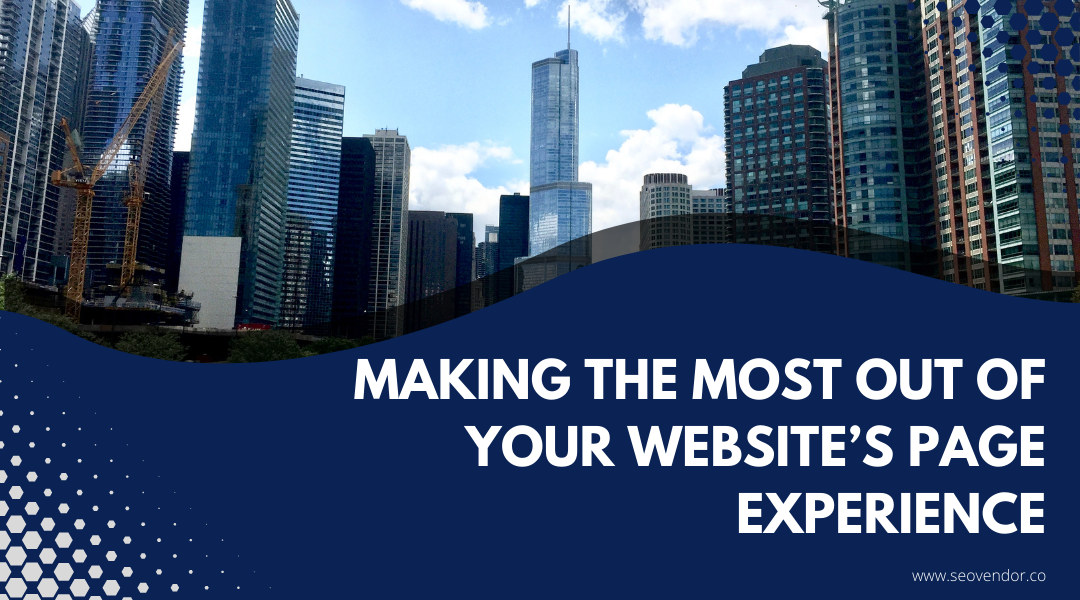One of the most essential features of a website is its page experience. It includes how users feel while using your site, and it has a significant impact on SEO.
Table of Contents
What is a page experience?
Page experience is the perception of how users feel when they interact with your website, including things like loading speed and ease of navigation. It encompasses three main factors:
- Visual stability (how stable or jittery the content appears on-screen)
- Speed (whether pages load quickly enough for people to have time before they lose interest in waiting)
- Accessibility (whether people can use all features on any device)
How does Google measure this?
Google has come up with some new metrics (Core Web Vitals) that measure real-world user experience for loading performance, interactivity, and visual stability of the page. These are based on data collected from Chrome users who have opted into syncing their browsing history. They’ll be available as part of Lighthouse’s “Opportunities” section along with other SEO audits like mobile-friendliness score. You can see how well your site performs against these key areas before making any changes.
What is a good page experience?
A good page experience should be free from annoying pop-ups, intrusive ads, and slow loading times so that users aren’t frustrated when using it. This will result in more traffic and higher conversion rates!
How does page experience affect SEO?
Google is placing an increasing emphasis on the user’s overall website experience regarding how well it ranks in search engine results pages (SERPs). The theory is that if users are happy with the experience of using a website, they’re more likely to return in the future and recommend it to others. This means that optimizing your page experience can significantly impact your SEO!
Ten Helpful Pointers That Can Significantly Improve Your Website’s Page Experience
- Use a fast and reliable hosting provider
- Optimize images for faster loading times
- Minimize the number of plugins you use
- Avoid intrusive ads or pop-ups
- Make sure all content is accessible on any device
- Test your website’s speed and responsiveness on different devices
- Prioritize page content over decorative elements
- Simplify navigation menus and avoid excessive scrolling
- Use clear, concise text that’s easy to read
- Check font sizes and color contrast ratios against accessibility guidelines.
So, what does this mean for your website? If you’re not already optimizing your page experience, now is the time to start! Following these simple tips can help improve user satisfaction, traffic, and even your SEO. And who knows – with a little effort, you may be able to achieve that perfect page experience!
While page experience is important, Google still seeks to rank pages with the best information overall, even if the page experience is subpar. For example, a website with great content but poor page experience may not rank as high as a website with average content that has good page experience. User experience is becoming an increasingly important factor in how Google ranks websites.
Page experience signals are Core Web Vitals, which is a set of metrics that measure real-world user experience for loading performance, interactivity, and visual stability of the page.
Existing Search Signals:
Mobile-Friendliness – A website must be responsive and optimized for mobile.
Safe-Browsing – Google’s security team developed Safe Browsing to let users know when a website is potentially harmful and to notify website owners of potential risk.
HTTPS – This protocol allows data to be delivered over a secure channel. It’s used to move encrypted HTTP information over a secure connection.
No intrusive interstitials – Intrusive interstitials are pop-ups, banners, and overlays that are displayed on websites to promote their products and distract the user’s intended purpose of reading material on the website. Google is against these kinds of displays/overlays. Better steer clear of putting this on your website.
Core Web Vitals – This is a fancy term for something very simple: the variables that make your website visitor have a pleasurable, seamless, and successful visit to your site. Most of them are concerned with how quickly and effectively the visual page loads.
Page Experience is important to SEO because optimizing your website’s page experience can result in higher traffic and conversion rates.









2 comments
Ronald Harvey
March 24, 2022 at 3:26 pm
I like how you explained it all in detail. I didn’t even know that page experience affects SEO, thanks for the tips! It definitely helped!
Russell Gibbons
October 28, 2022 at 12:21 pm
To sum up, every visitor wants to have that satisfactory and convenient experience when visiting a website. Thank you also for the 10 key pointers you’ve shared.
Comments are closed.